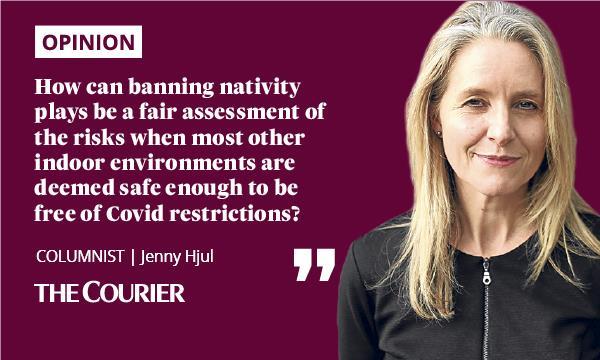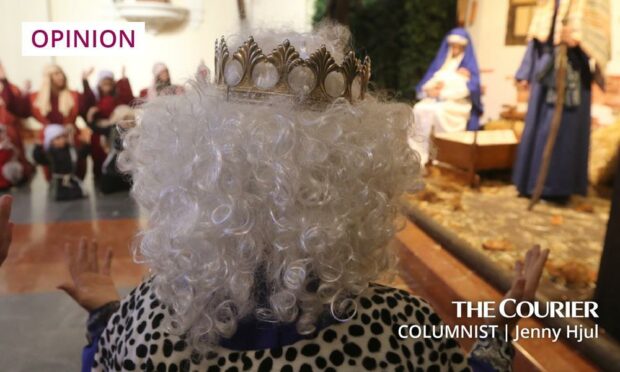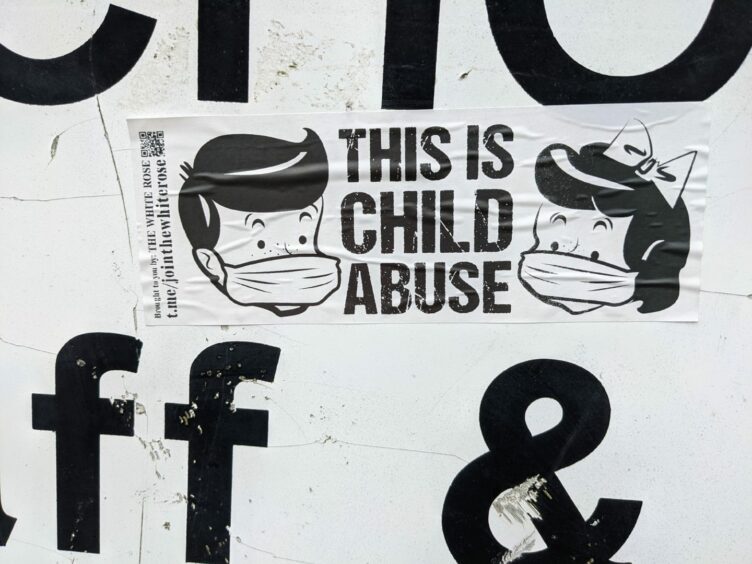It has been a long time since I watched a school nativity play, an event that is the highlight of Christmas if your own children are involved but a distant memory once they have grown up.
So I hadn’t realised that this year, when Covid restrictions have been lifted and we adults have all been mingling together since the summer, there is still a ban on school Christmas shows.
That is, live shows.
Under current Scottish government guidelines, nursery and primary schoolchildren can opt for virtual performances, which like virtual graduations and virtual sports days send a cold chill through the heart.

Councils are insisting that school plays and concerts will be no-go areas for the second year running because most local authorities have guidance that limits or prohibits parents from school grounds. Assemblies are also banned.
Aberdeen City, Aberdeenshire and Argyll and Bute Councils said this week that they will continue to follow public health advice against live school holiday plays and concerts. An Aberdeenshire Council spokeswoman said that all decisions are based on Scottish government guidance.
The government said it has adopted a ‘cautious’ approach and that ‘the safety of children, young people, and all education staff, remains the overriding priority’.
But how can banning nativity plays be a fair assessment of the risks when most other indoor environments are deemed safe enough to be free of Covid restrictions?
Rules appear different for COP26
It won’t have escaped parents’ notice that Scotland’s first minister, along with several of her colleagues, has been mixing with global visitors at COP26 in Glasgow this week.
Nicola Sturgeon was happy to be photographed up close and unmasked with overseas delegates, suggesting a shift in her attitude of extreme caution towards Covid.
An exchange of friendship… A cook stove from Malawi to Scotland and a quaich from Scotland to Malawi. Global South – Global North partnerships are key to tackling the #ClimateCrisis. @OxfamScotland @sccscot pic.twitter.com/ZdFxjcmVuF
— Jamie Livingstone (@JamiePolitics) November 8, 2021
Such a rethink is to be welcomed. Now that we have a successful vaccination programme, hospitalisations and deaths from Covid are greatly reduced, the fear factor is behind us, and we can, and largely have, been able to return to normality.
Except in schools.
Shops, pubs, restaurants, gyms, even nightclubs have reopened, dancing is allowed once more and singing is permitted in churches.
Why then are the very young being singled out for heavy-handed treatment when they of all age groups are the least susceptible to becoming sick from Covid?
Schools stuck in Covid time warp
According to the Scottish government, the evidence continues to suggest that children and adolescents (in particular those under the age of 14) transmit the virus at lower rates than adults, and are more likely to transmit among themselves than to adults.
Fears that children would pass on the virus to their teachers have proved groundless and yet our youngest citizens remain in a Covid time warp.
While mask wearing in schools was abandoned in England in May, with no detrimental consequences, in Scotland they are still mandatory.
Now a group of experts who advise the government have warned that teachers wearing face coverings in primary schools are harming the development of language and speech skills among vulnerable children.
Yet calls for mask rules to be relaxed, in primary and secondary schools, where children are masked all day, have been rejected by ministers, under pressure from teachers’ unions.
The front page of today’s @Telegraph Scottish edition pic.twitter.com/XhPQyhdv5g
— Simon Johnson (@simon_telegraph) November 9, 2021
Last month, Scotland’s chief medical officer linked the removal of masks to vaccination rates among teenagers. As usual in Scottish education, the welfare of pupils takes second place to political imperatives.
There is unlikely to be a return to normal life in classrooms before Christmas, although children have now endured a year and half of disruption.
How can Hampden be safer than a school hall?
In the summer, just as Covid curbs were being eased in most settings, outdoor nursery graduations were banned in some schools.
While 12,000 fans were allowed into Hampden to watch the Euros and a further 6,000 accommodated within the Glasgow Green fan zone, five-year-olds were subjected to stringent controls.
Six months on, little has changed. The Scottish Conservatives’ spokeswoman for children and young people, Meghan Gallacher, said: “It’s unfair that while people can currently attend all kinds of other events, parents won’t be able to see their children’s festive plays in person.
“We believe a change in Covid guidance is necessary to correct this anomaly immediately. Keeping these rules in place now doesn’t make sense.
“If people can attend nightclubs and gigs safely, surely parents can be allowed in to see their kids take part in Christmas concerts?”
School nativity plays may not be a government priority, but schools should be, and the damaging pattern of Covid closures and special measures must end.
If the education system aims to put children first – sometimes debatable in Scotland – then their needs have to take precedence over politics.

